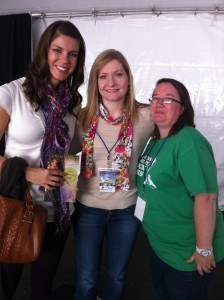Should You Be Friends with a Writer?

With writer friends Lindsey Leavitt and Crystal Perkins. Sure, we LOOK harmless enough…
Writers are interesting human beings. Most of them are creative, and some of them can tell hilarious stories at parties. Many have an innate understanding of what makes people tick. And if you want someone to deconstruct every minute detail of what your crush’s text really means, we’re usually SO up for that. Overanalyzing language and reading between the lines? Yes, please!
On the other hand, being friends with a writer has its downsides. When my husband introduces me to someone new, he often jokes, “She’s a writer, so be careful what you say around her; she’s liable to use it in a book.” He’s only partly kidding. Some of my favorite lines in my books were ripped from real life. For example, in Brand-New Emily, my protagonist calls an annoying old guy, “man with one foot in the grave.” That line came from my brother, probably a decade and a half before Emily was published. When Glenn was a young, up-and-coming advertising exec, an older man he worked with frequently referred to him as “young fella” in meetings. My guess is it was a passive aggressive way to remind Glenn of his lack of experience–probably because Glenn is ridiculously talented and the guy was afraid he’d show him up. Glenn got so sick of it that one day he told me, “If he says, ‘Right, young fella?’ to me one more time, I’m going to say, ‘Sure thing, man with one foot in the grave!’” I thought it was such a funny line that I stored it away and made Emily the quick-witted wisecracker who uttered that line. (Thanks, Glenn!)
Another thing to consider about being friends with a writer? You might think you want them to write about you. Every so often, someone asks me, “Will you put me in your next book?” That would be kinda cool, right? Maybe, maybe not. A writer friend might use something about you—your name, a personality trait, the shape of your weird birthmark—for a character, but not necessarily in a flattering way. We’re kind of horrible friends in that regard. For instance, I got the name for the antagonist in Emily from a friend at work. Luckily, the real-life Heatherly is a peach and thought that having a mean fictional girl as her namesake was a total hoot. Of course, I meant no ill will, but doesn’t the name Heatherly just scream popularity? I saw it in the window and had to have it.
More recently, my agent counseled me that a villain of mine needed to be more complex. “Show us a side of him that’s irresistible,” she said. So I modeled this irresistible side of him after a man I absolutely adored, who shaped my life immeasurably with his kindness and generosity of spirit. Yep. That’s the thanks he gets. All his awesomeness is now my villain’s. How’s that for gratitude? I feel sort of bad about it, but not bad enough not to do it. It’s just the kind of thing writers do.
With all this in mind, it’s not really surprising that so many great writers absolutely couldn’t stand other writers. That’s an interesting topic in and of itself. If you’d like to know more about some famous literary feuds (including Mark Twain’s scorching burn on Jane Austen—ouch!), click here.



